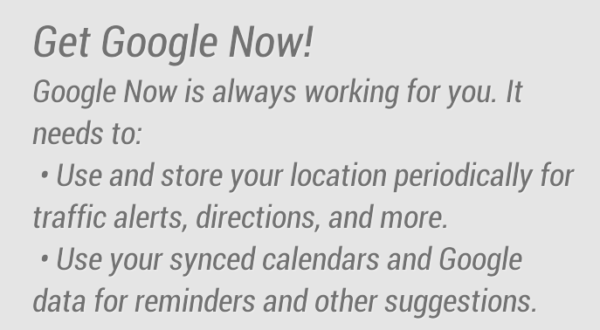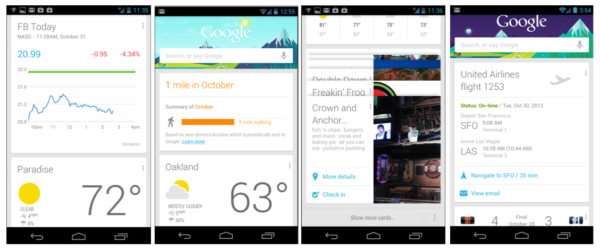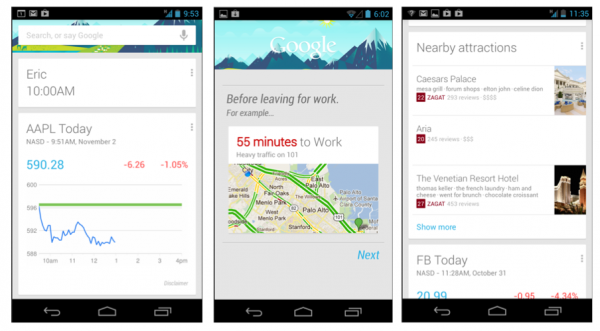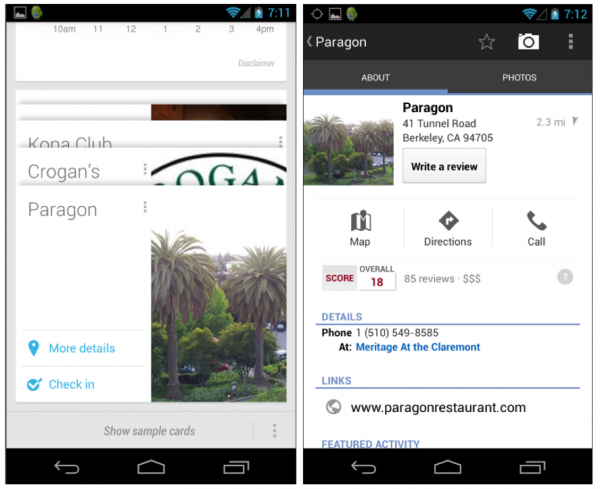“Google Now” Moving Well Beyond Search, Becoming Mobile Assistant
Almost exactly three years ago then Google employee Marissa Mayer described “the perfect search engine” in an interview with IDG News. She said it would be one “that could understand speech, questions, phrases, what entities you’re talking about, concepts. It would be able to search all of the world’s information, [find] different ideas and concepts, […]
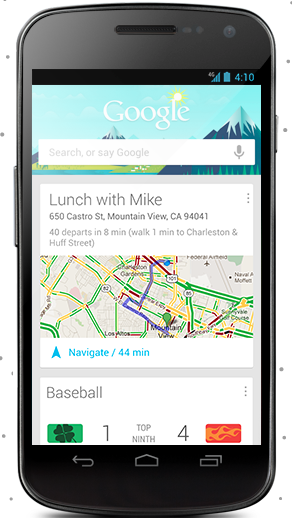 Almost exactly three years ago then Google employee Marissa Mayer described “the perfect search engine” in an interview with IDG News. She said it would be one “that could understand speech, questions, phrases, what entities you’re talking about, concepts. It would be able to search all of the world’s information, [find] different ideas and concepts, and bring them back to you in a presentation that was really informative and coherent.”
Almost exactly three years ago then Google employee Marissa Mayer described “the perfect search engine” in an interview with IDG News. She said it would be one “that could understand speech, questions, phrases, what entities you’re talking about, concepts. It would be able to search all of the world’s information, [find] different ideas and concepts, and bring them back to you in a presentation that was really informative and coherent.”
Mayer went on to add:
There are a lot of different aspects of research that need to go into building that search engine. You need to understand speech. You need to understand images. You need translation, so you can find the answer regardless of what language it’s written in. You need a lot of artificial intelligence to be able to analyze what information is relevant and synthesize it. You need a great user interface and user experience to put it in context. And you probably need a certain amount of personalization, so the search engine relates to the person, to their background, what they already know about, what they looked for last week.
Devices, Competition Force Change in Search Experience
At the time I wondered if an early, pre-Apple version of Siri would qualify under Mayer’s definition. Siri was not and is not a search engine, but a “virtual assistant” that uses a very different methodology to retrieve and enable users to act on information (e.g., buy movie tickets after a “voice search”). However, Siri can obtain information and do many things that might have gone through Google in the past.
A number of factors, including the app ecosystem, Siri and the constraints of smartphone screens, have now compelled Google to change the nature of the search experience it offers on mobile devices. On Android handsets in particular the Google “search experience” is evolving into something that extends well beyond what we think of as search.
Google Now and improved Voice Search, on Android and the new iOS Google search app, are central to that new experience. (Danny wrote a piece comparing Siri and the Google iOS app for the iPhone last week.) Google Now turns the cliche “answers not links” from a marketing slogan into something real.
Google Voice Search + Google Now together with Siri hold profound implications for the future of “mobile search.” Siri and, increasingly, Google Voice Search + Google Now are conditioning mobile users to interact with smartphones in very different ways than how people have historically searched on the PC. Mobile or virtual assistant is the new metaphor.
Google Now Improves with Jelly Bean 4.2
Google Now was introduced in June of this year. It was presented as a kind of “persistent contextual” search or discovery tool that incorporates your search history, location, time of day and several other categories of information to anticipate your needs or queries. Information “cards” pop up on the homescreen or when the search box is invoked.
A calendar entry for an upcoming meeting or the local weather, for example, would appear. Google Now also showed maps and traffic connected to recently searched-for destinations. The initial Google Now experience was flawed but immediately showed itself to be a provocative and potentially useful tool that was occasionally impressive.
With the release of the terrific Nexus 4 smartphone and Nexus 10 tablet comes Android operating system update Jelly Bean 4.2, which among other things includes expanded Google Now content and capabilities. The available “cards” have gone from a relatively small number to a much broader array of categories.
Google Now’s content now includes weather, flights, sports scores, stocks, traffic, public transportation, calendar reminders, hotels, local movies, language translation and currency rates, nearby photo spots, nearby restaurants and attractions — even how far you’ve walked or biked in a given month.
Google Now is still imperfect but it has become a great deal more useful. If you’re following particular sports teams or company stocks, for example, once Google understands that it will simply show you those “scores” when you swipe up from the bottom of the home screen. In the categories it serves Google Now effectively turns a swipe on the homescreen into a search. If you want the local weather you simply swipe the screen — no more keywords in query boxes.
The first time (during the US baseball playoffs) that Google Now started showing me Oakland A’s and San Francisco Giants scores I was surprised and impressed. I had been searching for the scores previously. Google incorporated that information into Now; and thereafter I didn’t have to search for it (or go to MLB.com or ESPN). I just started swiping homescreen vertically.
You can start to see some of the implications of this. For example, the ability to see nearby restaurants without having to initiate a search (or fire up an app) may eventually have a significant impact on other local search publishers and competitors.
Last week I was scheduled to go to the Microsoft Windows 8 event in San Francisco. Google Now cards appeared, notifying me that I had to leave my house (based on traffic and travel time) or I’d be late. That was both surprising and very helpful.
Search without Searching
Siri in an increasing number of cases eliminates the need to use a search engine because users go directly to an “answer” or into task completion (e.g., OpenTable, Fandango). But while it eliminates steps, users still are required to call up the information with a voice query — effectively conduct a search. With Google Now, when it works well, you don’t even need to “search.”
As I mentioned above, a range of personal data and other signals determine what Google shows you. (We could take a long detour now down privacy road; however we’ll leave that for another day.) Users do have have control over what cards appear and what content appears on them in many cases. This is a “power user” feature but very helpful and makes Google Now even better.
In the settings area of the Stocks card, for example, users can add companies or ticker symbols to see a highly customized display of companies they may be following. The same is true for sports teams: add or subtract teams to track them and see their scores.
The nearby business cards lead directly to the Google Places/Google+ Local pages, Maps and calls. Currently Google Now isn’t a great local search tool. But I would expect it to improve over time. As it does, local searchers with Android devices may become conditioned to simply swipe their screens to get a readout of nearby locations (this would work for Offers too). They could then quickly call or go to Maps.
This scenario, as you can imagine, would potentially cut other apps and even mobile search out of the equation. Again, the use of Google Now for local search offers only limited utility today but it will get more useful.
Google is probably some distance from monetizing Google Now, although I can imagine several ways that it could with “search” as well as display style ads.
Shifting the “Mobile Search” Paradigm
As with Siri on the iPhone, the more I use Google Now the more I find I’m relying on it for certain categories of information. My behavior is changing. Yet it’s not clear to me how many “ordinary” people have had any exposure to Google Now; it requires Jelly Bean, which is on a tiny minority of Android handsets. Eventually, however, Google Now may turn into a tool that a large number of people utilize and even customize as a shortcut to certain categories of content and “search results.”
Google Now (+ Voice Search) and Siri will probably never totally replace conventional mobile search but they reflect a rapidly evolving mobile user experience that is becoming radically different from search on the PC.
Contributing authors are invited to create content for Search Engine Land and are chosen for their expertise and contribution to the search community. Our contributors work under the oversight of the editorial staff and contributions are checked for quality and relevance to our readers. The opinions they express are their own.
Related stories
New on Search Engine Land
